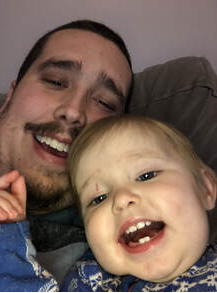Paternal Depression: The Challenges of Being a New Dad.
A story by Sam, Peer Mentor at The Wellness Initiative.

Growing up without a dad, I always imagined what it would be like to become one myself. But when my daughter was born via emergency C-section, it wasn’t the joyful moment I’d expected. Instead, I felt numb. I remember feeling exhausted and frightened as doctors rushed my partner away, and I was left trying to keep up. When they handed me my daughter and asked me to cut the cord, everything felt like a blur. I followed orders without thinking. Everything felt detached, like I was just going through the motions.
My daughter and I were separated from my partner as they needed to perform some tests. They checked and confirmed my daughter was healthy and then handed me a bottle to feed her with, I completely blanked on the fact we had decided to Breastfeed her.
Afterwards I went to see my partner, who was recovering but exhausted. A nurse told me to go home and return the next day, and I did, though my anxiety kept me up all night.
The next morning, when I saw my partner meeting our daughter for the first time as they had been separated throughout the night, I felt like a stranger to the experience.
The rest of our hospital stay flew by, filled with visitors and family asking about the baby and my partner’s recovery, and soon we were sent home.
At home, things took a turn. My partner struggled with breastfeeding and was clearly battling postpartum depression, while I tried to help her, suppressing my own emotions the whole time. I wanted so badly to love my daughter, but I couldn’t shake the feeling of numbness, and all I could focus on was how unhappy my partner was. When I went back to work after a few weeks, the drive was the first time I had been alone in weeks, and I finally allowed myself to cry. At work, I pretended everything was fine, showing off pictures and answering the same questions about my partner and baby, but inside I felt lost.
It took months before things started to settle. My partner’s mental health slowly improved, and so did mine. Eventually, I began to feel connection and strong feelings of love for my daughter, but guilt lingered. I felt like I hadn’t been the dad I should’ve been in those early months. Looking back now, I realize just how deeply I struggled with my own depression, and how, in the chaos of a new baby, dads are often overlooked. It was always "How's the baby? How's mom?" with maybe a passing comment about how tired I must be. But I never felt like anyone truly asked how I was doing.
I now know I wasn’t alone in feeling this way. In Australia, one in ten fathers experience postnatal depression, and the number rises to one in five for dads whose partners are also struggling with their mental health. Despite these statistics, the emotional well-being of fathers is often ignored or minimized. Of course, mums and babies absolutely deserve attention and support during this critical time, but the focus on them can sometimes leave dads feeling overlooked. Many fathers, like I did, end up struggling silently, caught in the chaos of supporting their partner while also managing their own emotions. Reflecting on my own experience, I can see how easy it is for dads to get lost in the shuffle when they need help too.
Looking back, I wish I had known it was okay to ask for help, to take a step back and recognise my own struggles. Becoming a dad is a huge life change, and it's important to remember that supporting the dad is just as crucial as supporting the mum. Now, I’m more aware of the importance of self-care and reaching out when things feel too much. Fatherhood is a journey, and it’s one that should be shared—by both parents—without shame or silence.
My daughter and I were separated from my partner as they needed to perform some tests. They checked and confirmed my daughter was healthy and then handed me a bottle to feed her with, I completely blanked on the fact we had decided to Breastfeed her.
Afterwards I went to see my partner, who was recovering but exhausted. A nurse told me to go home and return the next day, and I did, though my anxiety kept me up all night.
The next morning, when I saw my partner meeting our daughter for the first time as they had been separated throughout the night, I felt like a stranger to the experience.
The rest of our hospital stay flew by, filled with visitors and family asking about the baby and my partner’s recovery, and soon we were sent home.
At home, things took a turn. My partner struggled with breastfeeding and was clearly battling postpartum depression, while I tried to help her, suppressing my own emotions the whole time. I wanted so badly to love my daughter, but I couldn’t shake the feeling of numbness, and all I could focus on was how unhappy my partner was. When I went back to work after a few weeks, the drive was the first time I had been alone in weeks, and I finally allowed myself to cry. At work, I pretended everything was fine, showing off pictures and answering the same questions about my partner and baby, but inside I felt lost.
It took months before things started to settle. My partner’s mental health slowly improved, and so did mine. Eventually, I began to feel connection and strong feelings of love for my daughter, but guilt lingered. I felt like I hadn’t been the dad I should’ve been in those early months. Looking back now, I realize just how deeply I struggled with my own depression, and how, in the chaos of a new baby, dads are often overlooked. It was always "How's the baby? How's mom?" with maybe a passing comment about how tired I must be. But I never felt like anyone truly asked how I was doing.
I now know I wasn’t alone in feeling this way. In Australia, one in ten fathers experience postnatal depression, and the number rises to one in five for dads whose partners are also struggling with their mental health. Despite these statistics, the emotional well-being of fathers is often ignored or minimized. Of course, mums and babies absolutely deserve attention and support during this critical time, but the focus on them can sometimes leave dads feeling overlooked. Many fathers, like I did, end up struggling silently, caught in the chaos of supporting their partner while also managing their own emotions. Reflecting on my own experience, I can see how easy it is for dads to get lost in the shuffle when they need help too.
Looking back, I wish I had known it was okay to ask for help, to take a step back and recognise my own struggles. Becoming a dad is a huge life change, and it's important to remember that supporting the dad is just as crucial as supporting the mum. Now, I’m more aware of the importance of self-care and reaching out when things feel too much. Fatherhood is a journey, and it’s one that should be shared—by both parents—without shame or silence.
Did you know that Sam is a Peer Mentor with The Wellness Initiative?
The Wellness Initiative would like to acknowledge the traditional custodians of this land, the Nyoongar people. We acknowledge and respect their continuing culture and the contribution they make to the life of this region, city and boodja, and pay our respects to Elders past, present and emerging.
© 2025 The Wellness Initiative Pty Ltd. all rights reserved
ABN 21 633 581 450
Servicing Perth and surrounds
Email: info@wellnessinitiative.com.au
Phone: 0478 511 825
Follow us on socials!
